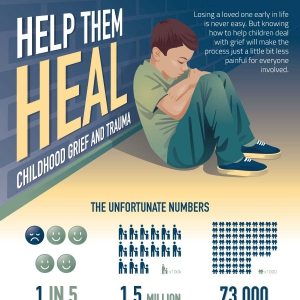Childhood Grief and Trauma
Losing a loved one early in life is never easy. But knowing how to help children deal with grief will make the process just a little bit less painful for everyone involved.
The Unfortunate Numbers
1 in 5
Number of children who will experience the death of a close friend or relative by the age of 18 (1)
1.5 million
Number of children living in a single-parent household because of the death of a parent (1)
73,000 children die each year, with 83% of them having surviving siblings (2)
Grieving children often have the following issues in school: (2)
Difficulty concentrating in class
Social withdrawal
Absenteeism
Decrease in schoolwork quality
Decrease in assignment completion
69%
Percentage of teachers who have had at least one student in the past year who has lost a close relative or friend (2)
26%
Percentage of children who will witness a traumatic event before they turn 4 (3)
Children who experience trauma are… (3)
…15 times more likely to commit suicide.
…4 times more likely to become alcoholics later in life.
…3 times more likely to develop depression.
National Bereavement Poll
A 2011 poll of bereaved children and adolescents can tell us a lot about how children grieve and the obstacles they face during the process. (4)
Common reactions to death and grief
Denial: 46%
Trouble sleeping: 39%
Trouble concentrating at school: 45%
Saying hurtful things to others: 34%
Acting out physically/emotionally: 41%
Things that help
Listening to music: 49%
Staying busy/distracted: 46%
Going to group grief counseling: 42%
Spending time with friends: 59%
Spending time with family: 55%
Talking with others who are grieving: 41%
Keeping photos/belongings of deceased: 71%
The hardest part of losing someone
Talking with friends about death: 52%
Talking to current guardian: 33%
Wishing they had more time with deceased: 86%
Always missing the deceased person: 71%
How You Can Help
It isn’t easy to know what to say to anyone when someone dies. But children grieve differently than adults, and these tips just might help make the process a little easier for the both of you. (5)
Answer every question they ask honestly.
Lying to children or using metaphors to answer their questions is not helpful. In order to grieve, they must first understand the situation. While you may think you are being gentle with them, you are actually delaying the grieving process by withholding the truth.
Consider therapy.
Sometimes it’s hard for children to open up to those close to them after a death. Many benefit greatly from talking to a therapist who specializes in childhood grief and trauma. Family therapy is also an option, as some children feel safer talking about their emotions with loved ones around.
Give children choices.
There is no right way to grieve. Some children will be inconsolable for days on end and then one day start daily life again. Others will have intermittent bouts of sadness in an otherwise normal routine. Let children choose which activities they want to participate in while they are grieving, and give them choices with their daily schedule.
Talk about the person who has died.
Though it may be painful to you, children want to talk about the deceased. Though some may draw inward, many children will want to talk about their memories. They need to know that it is not inappropriate to talk about the deceased, and that the person can “live on” through sharing stories.
Respect how children grieve.
Some children may want pictures of the deceased relative or friend around, while some may not. Some children may want to continue on with a normal daily routine, while others may need time at home and away from people. Let the child’s natural grieving process play out, and make yourself available for them.
Listen.
Let them share stories or memories or just talk about death in general. Never make a child feel as though they should hold any emotion in, be it happiness, sadness or even anger.
Give children their own memorial service, ritual or commemorative activity.
Some children may want to be present at the deceased’s funeral or wake. However, some may not want to publicly grieve. Give children an opportunity to say goodbye with their own memorial activity, be it planting a flower or tree on the behalf of the deceased or holding a private candle-lighting ceremony in your home.
Let them take breaks from their grief.
Most children will still want to play outside or watch TV or meet with friends while they are still grieving. It isn’t that they are being flippant or disrespectful to the deceased, but children need breaks from intense sadness to momentarily divert their attention to happier things.
SOURCES:
1. http://www.childrensgriefawarenessday.org


